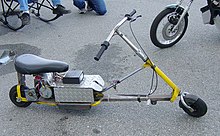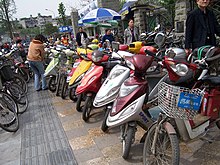Electric motorcycles and scooters

Electric motorcycles and scooters are vehicles with two or three wheels that use electric motors to attain locomotion.
History

- Late 1860s: Earliest references to electric motorcycles can be found in patents.
- 1911: Electric motorcycle available according to early Popular Mechanics article.[1]
- 2007:
- A123 Li-Ion cell-powered Killacycle makes new quarter mile (400-metre) record of 7.824 seconds and 168 mph (270 km/h) in Phoenix, AZ at AHDRA 2007.[2]
Power source

Generally, the source of power for the electric motor has been batteries, but development in fuel cell technology has created several prototypes. Some examples are: the ENV from Intelligent Energy, Honda's scooter using the Honda FC Stack, and the Yamaha FC-AQEL. Also, petroleum hybrid-electric motorcycles are under development. Some examples are the Ecycle, and Yamaha's Gen-RYU.
Advantages and disadvantages
Electric motorcycles and scooters are rising in popularity because of higher gasoline prices. Battery technology is gradually improving making this form of transportation more practical.[3]
Disadvantages:
- Up front costs are higher than for a comparable gasoline powered motorcycle or scooter.
- Shorter range before recharging.
- Longer "fill up" or recharge time.
- Lower maximum speed at similar price points.
- Electric power outlets are often not conveniently located near streets or driveways. It is often difficult or impossible to bring the battery into an apartment, for example, for recharging.
- Battery capacity can be as low as 20% on a cold winter day with -20 °C (lead battery)
- As it is already difficult to be "noticed" by cars/trucks on a motorcycle, the loss of characteristic engine noise might make riding these even more dangerous than their internal combustion engine powered counterparts.

Advantages of electric over gasoline power:
- The fuel costs for electric power are approximately 25% the cost of gasoline power (US, mid-2008; see Electric car, "Running costs" for the calculation)[4]
- Nearly silent.
- Environmental friendly (no exhausted gases at point of use)
- Using grid power to charge batteries causes less pollution than gasoline scooters; the amount of emissions caused depends on the sources of the electricity used.
- No trips needed to a gas station-- can be recharged at home or in charging stations.
- It can be used in a V2G system.
- Lower maintenance costs and fewer maintenance activities; for example, there is no need to change the oil.
- Can be ridden indoors.
- More affordable than electric cars.
Types

A scooter is a type of motorcycle with a step-through frame and usually with smaller wheels designed for urban transportation.
Various types of scooters
Scooters are divided into categories as per the particular niche that they are designed to operate in and speed requirements:
- Two-wheeled Vespa-styled scooters 0-60 mph (0-100 km/h)
- Two-wheeled Stand-up scooters (like a kick scooter) 0-25 mph (0-40 km/h)
- Two-wheeled, side-by-side stand-up scooters like manufactured by Segway PT 0-12 mph (0-20 km/h)
- Two-wheeled Seated scooters 0-25 mph (0-40 km/h)
- Three-wheeled standup scooters like manufactured by Zap 0-15 mph (0-25 km/h)
- Three- and four-wheeled Mobility scooter (disability riders) 0-10 mph (0-15 km/h)
- Three- and four-wheeled Seated scooters/golf carts 0-25 mph (0-40 km/h)
Electric motorcycle or electric bicycle

Two-wheeled motorcycles are generally differentiated from motorized bicycles and mopeds (motorized pedal cycles) by speed, with motorcycles having greater speeds—usually greater than 30 mph (about 50 km/h). Although, this line for what constitutes a 2 wheeled motorcycle has blurred due to marketing, styling, and public opinion.
Main categories of 3-wheeled motorcycles
Due to vagueness in motor vehicle laws, any three-wheeled vehicle that can travel over 31 mph (50 km/h) may be classified as a motorcycle. This classification does not depend on whether the operator is fully enclosed by a "cage" or exposed to the elements. Several automotive startup companies made their initial designs three wheeled vehicles, because the motorcycle classification does not require the same costly battery of crash safety testing as a four wheeled vehicle.
For design purposes, three wheeled vehicles are divided into 2 categories:
- 1 wheel in front and 2 in back, known as a delta design or the traditional trike (tricycle) design
- 2 wheels in front and 1 in back, known as a tadpole design.
Some three wheeled motorcycles enclose the rider in a "cabin" or cockpit. These include the Gizmo, Twike, Myers Motors NmG.
Some three wheeled motorcycles have independent suspension allowing the vehicle to tilt or lean, such as the Carver one.
Comparison of select production vehicles
| Name | Top Speed | Power | Cost | Vehicle type | Battery | Range | Comments | ||
|---|---|---|---|---|---|---|---|---|---|
| Type | Life | Capacity | |||||||
| Vectrix | 62 mph (100 km/h) | 20 kW[5] | $8,800 | Scooter | Nickel metal hydride (NiMH) provided by GP Batteries |
10 years or 50,000 miles / 80,000 km | 30 A·h, 3.7 kW·h | 68 miles @ 25 mph (110 km @ 40 km/h) | Review |
| Yo Speed | (45 km/h) | 750W | Rs.35000(~$815) | Scooter | 80 km @ 70kg [6] | Review | |||
| ZAP Xebra | 40 mph (65 km/h) | $10,000 | 3 Wheel | Lead acid | 3 years | 25 miles at 30 mph (40 kilometres at 50 km/h) | review[citation needed] | ||
| ZAP Zapino | 30 mph (48 km/h) | 3 kW | $3,500 | Scooter | Lead acid (Lithium option) | 38 A·h | 30 miles | ||
| EVT-4000e | 30 mph (50 km/h) | 1500W | $2,900 | Scooter | Lead acid, 4x12 | 1.5 - 2 years [7] | 50 A·h | 25 to 35 miles (40 to 55 km) | Solar Mod, Taiwanese Manufacturer |
| Zero X | + Template:Mph | 17.4kW 23 HP | High Power $8350 Standard $7450 | Off-road Motorcycle | Patent-pending lithium ion array | ? | 2 kWh | Template:Mile 2hrs | Zero Motorcycles |
| Electric GPR-S | 70 mph (112 km/h) | 14.2 kW | $8,000 | Motorcycle | 24 Lithium cells | 2000+ charge cycles | 3.3 kWh | 60 miles (economy setting) | Available October 2008 |
| XM 5000Li | 60 mph (96 km/h) | 5.000W | $6,499 | Scooter | 21 Lithium cells | 2000+ charge cycles | 60 A·h | 85 miles | [1]Review |
Comparison of select upcoming vehicles
| Name | Top Speed | Power | Cost | Vehicle type | Battery | Range | Comments | ||
|---|---|---|---|---|---|---|---|---|---|
| Type | Life | Capacity | |||||||
| EV-X7 | 92mph | $2100+ | Motorcycle | ? | ? | 2130W | 180km (110 miles) |
Available in 2008. | |
| Brammo Enertia | 50+ mph (80 km/h) | $11,995+ | Motorcycle | 6 Lithium Phosphate by Valence | 20,000 miles (32,000 kilometres) | 3.1 kWh | 45+ miles (70+ kilometres) |
Available in 2008. | |
| VentureOne | 75+ mph (120+ km/h) | 40+ kW | $23,000 | 3 Wheel | Lithium-ion batteries by A123Systems | 5000+ charge cycles | 120 miles (about 200 km) | video Available in 2010. | |
| Aptera Typ-1e | 85 mph (135 km/h) | 30 kW | $27,000 | 3 Wheel | Lithium Phosphate, unknown manufacturer | ? | 10 kWh | 120 miles (190 km) | Production expected in October 2008. |
| EVC Volta G/T Metro | 70 mph (112 km/h) | 8 kW | $7,995 | Scooter | Lithium ion | ? | 8 kWh | 75 miles at optimized speed | Production in summer 2008. |
| EVC Roadking | 91 mph (146 km/h) | 15 kW | $9,895 | Scooter | Lithium ion | ? | 8.2 kWh | 75 miles at optimized speed | Production in summer 2008. |
| EVC X21 | 107 mph (171 km/h) | 21 kW | $10,950 | Scooter | Lithium ion | ? | 8.2 kWh | 75 miles at optimized speed | Production in summer 2008. |
| Piaggio MP3 | ? | plugin-hybrid | ? | 3-Wheel | ? | ? | ? | ? | |
List of electric motorcycles and scooters
- Zero X from Zero Motorcycles [8].
This section needs expansion. You can help by adding to it. (October 2008) |
Conversion
Some people acquire motorcycles where the engine is worn out, or has been over-revved and damaged. One person has started an electric motorcycle company where he is buying everything from the manufacturer except the motor and gas tank, then making the conversion, as Enertia and others [9].
[10] EVAlbum.com/type/mtcy is a great resource for those interested in converting a gasoline powered bike to electric. This website has hundreds of bikes that have been converted along with specific details regarding each bike.
Kawasaki Ninja sport bikes are being converted from gasoline to electric.
If you can cut metal with a hacksaw and use a ratchet wrench, you can build this bike. Converting a motorcycle is the easiest EV conversion out there — you don't need a transmission or deal with air conditioning, power brakes, power steering, etc. And you can scale up the performance and range as you gain confidence in the technology and your own skill set. [11].
In the Secrets of El Ninja, John Bidwell [12] recommends beginning with something as simple as a 24-volt machine which utilizes just two, inexpensive lead-acid batteries: he prefers common Group 24 RV [13], 85 amp-hour, "watered" versions because of their lower cost over sealed, AGM-type batteries, though if you dump an AGM-powered bike, there's less chance you'll spill battery acid on yourself or the machine and are available at your local K-Mart or Walmart. It'll have a top speed of under Template:Mph (which keeps it in the moped class) and range around Template:Mile or so, depending on terrain and the size of the driver. Adding more batteries increases both range and performance, as well as weight and cost. He sees the ideal street machine being 72-volts, which will get you to Template:Mph in a short burst, but you'll quickly drain the battery and possibly overheat the motor. He's run driving tests and found that in normal city stop-n-go traffic, he's gotten as high as Template:Mile on a charge [11].
Promotion
Premier of the Republic of China Liu Chao-shiuan said that the government-financed Industrial Technology Research Institute (ITRI) will help domestic manufacturers churn out some 100,000 electric motorcycles in four years [14].
References
- ^ ElectricMotorcycles.net-EM Headline News » EM History: 1911 Popular Mechanics
- ^ KillaCycle - World’s Quickest Electric Motorcycle » Blog Archive » 7.824 @168 MPH !!!!!! at Pomona AHDRA Nov 10th
- ^ Technology Review: Making Electric Vehicles Practical
- ^
U.S. Department of Energy (DOE) (2000-07-12). "Federal Register Vol. 64 No. 113" (PDF). U.S. GPO. Retrieved 2006-09-22.
{{cite journal}}: Cite journal requires|journal=(help) - ^ http://www.vectrixeurope.com/Portal/3/Language/46/Page/16/Vectrix_Specs.aspx
- ^ http://www.induselectrans.com/yo_speed.htm
- ^ http://www.evt.com.tw/html/q_and_a/english/q_1.htm
- ^ http://www.zeromotorcycles.com/
- ^ http://www.enertiabike.com
- ^ http://www.EVAlbum.com/type/mtcy
- ^ a b http://www.evworld.com/article.cfm?storyid=1024
- ^ http://www.21wheels.com/elninja.html
- ^ http://www.apexbattery.com/group-24-agm-rv-battery-rv-batteries.html
- ^ http://www6.lexisnexis.com/publisher/EndUser?Action=UserDisplayFullDocument&orgId=101846&topicId=104970025&docId=l:837646769
See also
- Electric bicycle
- Battery electric vehicle
- Electric dragbike
- Electric vehicle
- Motorcycle Industry Council
- Plug-in hybrid
- Scooter (motorcycle)
- Seated electric scooter
External links
- 7 Electric Motorcycles You Must See (including 1 that does 0-60 MPH in 0.97 seconds) (TreeHugger).
- Details on how to build an electric motorcycle including a parts list and links where the parts can be purchased (www.electricmotion.org)
- V-EM-60-21 from Elite Power Solutions
- Comparison table of currently available electric motorcycles, mopeds & scooters
